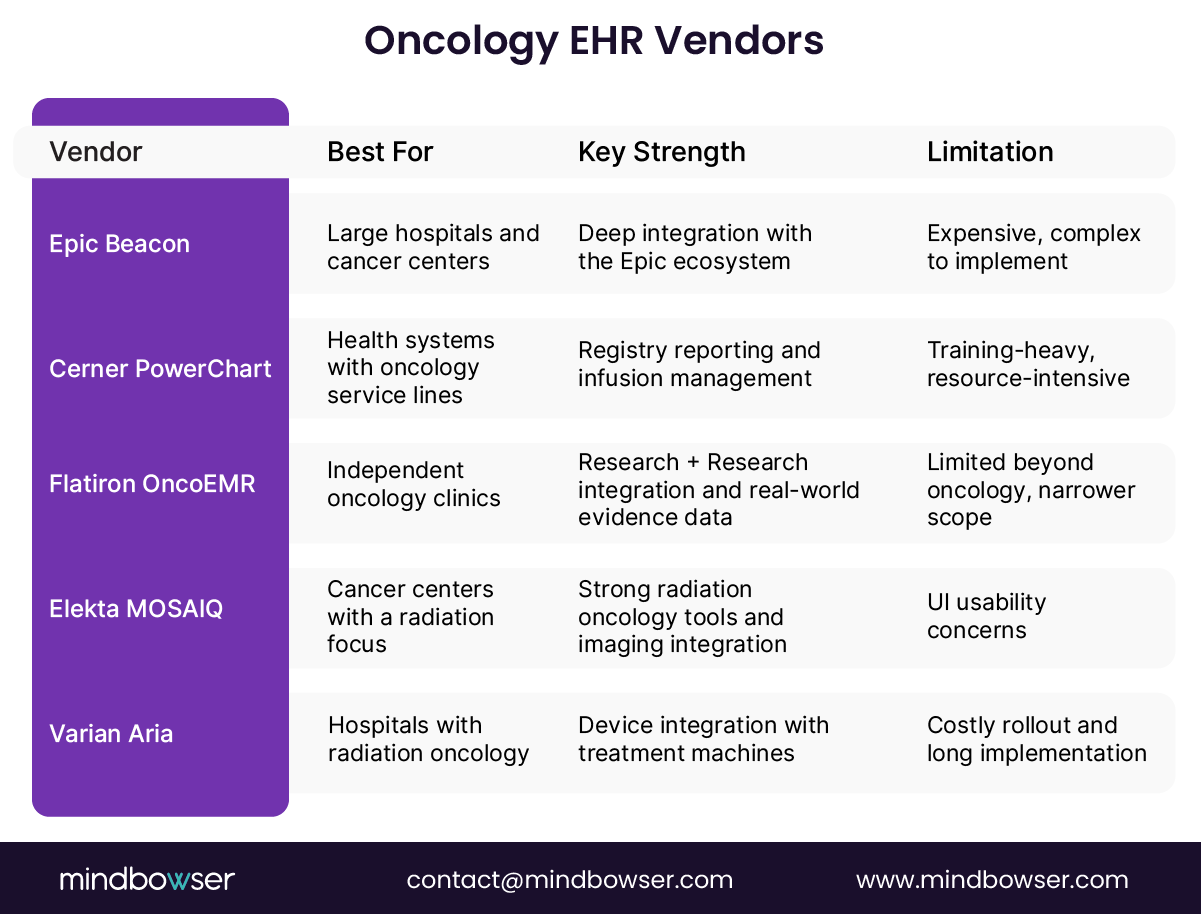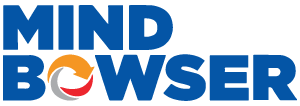An oncology EHR is a type of electronic health record software specifically designed for cancer care. Unlike general EHRs, it includes tools for chemotherapy ordering, infusion scheduling, radiation workflows, and oncology billing services. The goal is to help oncologists manage complex treatments while staying compliant with reporting standards.
Oncology practices face challenges that general EHRs cannot always handle. Providers must track multiple cycles of chemotherapy, manage toxicity monitoring, integrate genomic test results, and support clinical trials. Specialized oncology EHR software streamlines these workflows, reducing errors and improving care coordination across multidisciplinary teams.
Oncology EHR vendors are not simply offering general-purpose systems. They provide software built to meet the clinical and administrative complexities of cancer care. Below are the core areas that set oncology EHR software apart from traditional EHRs.
Selecting the right oncology EHR software requires more than looking at features. Practices need to evaluate how well the system will support their size, specialty focus, and long-term growth. Below are the critical factors to consider when reviewing oncology EHR vendors.
The oncology EHR market includes both enterprise platforms and specialty-focused solutions. Each vendor brings distinct advantages and trade-offs. Below is a detailed comparison of the top oncology EHR vendors.

Selecting the right oncology EHR software requires balancing clinical needs, compliance, and financial considerations. Below are key steps to guide practices in making the best decision.
Choosing the right oncology EHR vendor is only the first step. Ensuring smooth integration, compliance, and long-term usability is where many practices face challenges. This is where Mindbowser helps oncology providers bridge the gap between technology and care delivery.

Oncology EHR vendors offer specialized tools that enable cancer care teams to manage complex treatments, ensure compliance, and achieve better patient outcomes. From Epic Beacon and Cerner PowerChart to Flatiron OncoEMR, Elekta MOSAIQ, and Varian Aria, each vendor brings strengths and trade-offs.
The key takeaway is simple: practices should select oncology EHR software based on their size, specialty, and integration needs. Small clinics may find value in cloud-based systems with lower costs, while large cancer centers benefit from enterprise platforms with deep interoperability.
Mindbowser helps providers go beyond vendor selection by ensuring smooth integration, compliance, and scalability. With proven expertise in oncology EHR implementation and billing workflows, we support practices in building systems that improve care and financial performance.
A general EHR covers broad medical documentation, while oncology EHR software is designed for cancer care. It includes chemotherapy protocols, infusion scheduling, and cancer registry reporting, which are often lacking in general systems.
Cloud-based systems, such as Flatiron OncoEMR, CureMD, and AdvancedMD, are better suited for smaller oncology practices due to their more straightforward setup, lower upfront costs, and simpler workflows.
Oncology EHRs support accurate coding for chemotherapy, infusion therapy, and complex oncology treatments. Built-in billing workflows reduce claim denials and ensure compliance with payer rules.
Key factors include interoperability with existing hospital systems, compliance with HIPAA and ONC, support for FHIR/HL7 standards, patient engagement features, scalability, and total cost of ownership.

We worked with Mindbowser on a design sprint, and their team did an awesome job. They really helped us shape the look and feel of our web app and gave us a clean, thoughtful design that our build team could...


The team at Mindbowser was highly professional, patient, and collaborative throughout our engagement. They struck the right balance between offering guidance and taking direction, which made the development process smooth. Although our project wasn’t related to healthcare, we clearly benefited...

Founder, Texas Ranch Security

Mindbowser played a crucial role in helping us bring everything together into a unified, cohesive product. Their commitment to industry-standard coding practices made an enormous difference, allowing developers to seamlessly transition in and out of the project without any confusion....

CEO, MarketsAI

I'm thrilled to be partnering with Mindbowser on our journey with TravelRite. The collaboration has been exceptional, and I’m truly grateful for the dedication and expertise the team has brought to the development process. Their commitment to our mission is...

Founder & CEO, TravelRite

The Mindbowser team's professionalism consistently impressed me. Their commitment to quality shone through in every aspect of the project. They truly went the extra mile, ensuring they understood our needs perfectly and were always willing to invest the time to...

CTO, New Day Therapeutics

I collaborated with Mindbowser for several years on a complex SaaS platform project. They took over a partially completed project and successfully transformed it into a fully functional and robust platform. Throughout the entire process, the quality of their work...

President, E.B. Carlson

Mindbowser and team are professional, talented and very responsive. They got us through a challenging situation with our IOT product successfully. They will be our go to dev team going forward.

Founder, Cascada

Amazing team to work with. Very responsive and very skilled in both front and backend engineering. Looking forward to our next project together.

Co-Founder, Emerge

The team is great to work with. Very professional, on task, and efficient.

Founder, PeriopMD

I can not express enough how pleased we are with the whole team. From the first call and meeting, they took our vision and ran with it. Communication was easy and everyone was flexible to our schedule. I’m excited to...

Founder, Seeke

We had very close go live timeline and Mindbowser team got us live a month before.

CEO, BuyNow WorldWide

Mindbowser brought in a team of skilled developers who were easy to work with and deeply committed to the project. If you're looking for reliable, high-quality development support, I’d absolutely recommend them.

Founder, Teach Reach

Mindbowser built both iOS and Android apps for Mindworks, that have stood the test of time. 5 years later they still function quite beautifully. Their team always met their objectives and I'm very happy with the end result. Thank you!

Founder, Mindworks

Mindbowser has delivered a much better quality product than our previous tech vendors. Our product is stable and passed Well Architected Framework Review from AWS.

CEO, PurpleAnt

I am happy to share that we got USD 10k in cloud credits courtesy of our friends at Mindbowser. Thank you Pravin and Ayush, this means a lot to us.

CTO, Shortlist

Mindbowser is one of the reasons that our app is successful. These guys have been a great team.

Founder & CEO, MangoMirror

Kudos for all your hard work and diligence on the Telehealth platform project. You made it possible.

CEO, ThriveHealth

Mindbowser helped us build an awesome iOS app to bring balance to people’s lives.

CEO, SMILINGMIND

They were a very responsive team! Extremely easy to communicate and work with!

Founder & CEO, TotTech

We’ve had very little-to-no hiccups at all—it’s been a really pleasurable experience.

Co-Founder, TEAM8s

Mindbowser was very helpful with explaining the development process and started quickly on the project.

Executive Director of Product Development, Innovation Lab

The greatest benefit we got from Mindbowser is the expertise. Their team has developed apps in all different industries with all types of social proofs.

Co-Founder, Vesica

Mindbowser is professional, efficient and thorough.

Consultant, XPRIZE

Very committed, they create beautiful apps and are very benevolent. They have brilliant Ideas.

Founder, S.T.A.R.S of Wellness

Mindbowser was great; they listened to us a lot and helped us hone in on the actual idea of the app. They had put together fantastic wireframes for us.

Co-Founder, Flat Earth

Mindbowser was incredibly responsive and understood exactly what I needed. They matched me with the perfect team member who not only grasped my vision but executed it flawlessly. The entire experience felt collaborative, efficient, and truly aligned with my goals.

Founder, Child Life On Call

The team from Mindbowser stayed on task, asked the right questions, and completed the required tasks in a timely fashion! Strong work team!

CEO, SDOH2Health LLC

Mindbowser was easy to work with and hit the ground running, immediately feeling like part of our team.

CEO, Stealth Startup

Mindbowser was an excellent partner in developing my fitness app. They were patient, attentive, & understood my business needs. The end product exceeded my expectations. Thrilled to share it globally.

Owner, Phalanx

Mindbowser's expertise in tech, process & mobile development made them our choice for our app. The team was dedicated to the process & delivered high-quality features on time. They also gave valuable industry advice. Highly recommend them for app development...

Co-Founder, Fox&Fork
